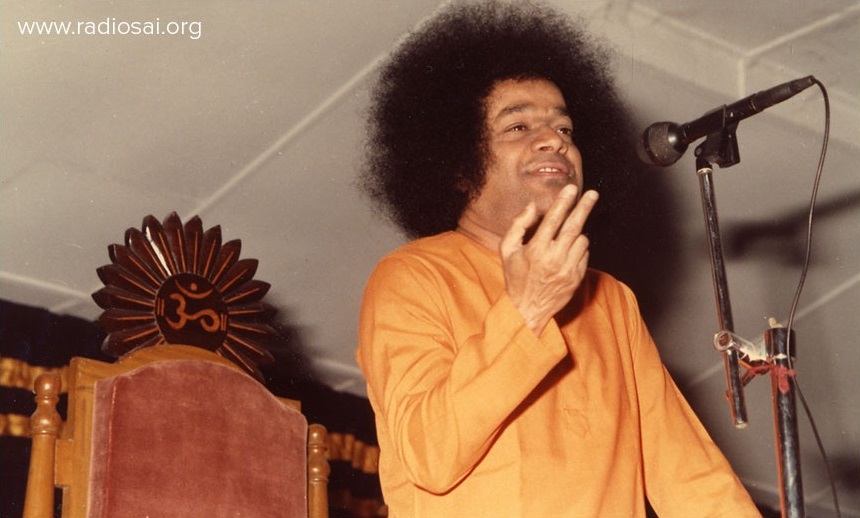
Sri Sathya Sai Speaks
Divine Discourses spanning 7 Decades (1950 – 2011)
Sri Sathya Sai Speaks, Vol 17 (1984) (Download)
13 January 1984 | Prasanthi Nilayam | Sankranthi, Sports Meet
The most precious period
IN one’s life, the years sixteen to thirty are the most precious. This is the period when all of one’s faculties and energies are at their peak. Hence one should strive to make the best use of this period. Noble qualities like self-confidence, sacrifice, aspiration and courage must be acquired then. If this time of one’s life is wasted, there will only be failures in later years. Bad thoughts, bad practices and backbiting should be eschewed altogether. During this crucial period, one should try to understand the purpose of life and concentrate one’s efforts on achieving one’s ideals. No spiritual effort is possible when one has dissipated one’s physical and mental abilities. It is a pity that young people misuse these precious years of their lives by falling into bad ways. Swami expects them to develop all their human endowments and lead exemplary lives which will be an object-lesson to others. What we witness today in the world, however, is a great deal of play-acting. All appear as devotees and all proclaim their spirit of sacrifice. Everyone declares himself or herself as a sadhaka (spiritual aspirant). Every believer claims that he is seeing God. One must enquire whether it is the so-called devotee who is seeking God or whether it is God who is searching for a true devotee. Is the sadhaka serving God or is God serving the sadhaka – that is the question. The service that the sadhaka is doing is trivial. Offering to God what God has provided is like offering to the Ganga water from the Ganga. The truth is it is God who is rendering service to the devotee. All the capacities given by God should be used in the service of the Divine. There is no need to go in quest of God. God is all the time searching for the genuine and steadfast devotee. The sadhaka is approaching God for the fulfilment of his desires. He is after petty and transient benefits. He does not seek to understand the nature of true love or the Divinity that underlies everything. Today’s sadhaka proves himself to be a self-deluded being with no moral commitment.
Three most important human values
The real criterion of moral conduct is harmony between one’s profession and one’s practice. Morality consists in acting up to the rules of fight conduct prescribed by society at a particular time and for an individual or group. If there is no connection between what one professes in words and his actions, morality cannot exist. Of all human values, three are most important. The foremost is love of God. Where there is love there is sacrifice. There arises purity of heart. There should be a fusion of love, sacrifice and purity. They are not mere human qualities. They constitute vital organs of a human being. They are as essential for a human being as the head, hands and legs for the body. Without these attributes, no one is a complete human being. Just as the Sun can be seen only by his own light, the love of the Divine can be acquired only by Divine Grace and not by trivial spiritual practices. These sadhanas (spiritual practices) are invariably motivated by selfish objectives. There is an element of selfishness in every service which man undertakes. All undertakings are tainted by egoism or the acquisitive urge. Only when the sadhaka’s heart is filled with the Divine, will he be able to entertain pure and sacred love.
Time is all-powerful, not subject to any one
Students must bear in mind that their life is determined by their actions, whether they are good or bad. The other determining factor is Time. Time is all-powerful. It is not subject to any one. All are subject to it. It rolls on without beginning or end. Rama’s exile, Ravana’s death, emperor Bali’s descent to the nether world, Sibi’s supreme sacrifice, the ordeals of the Pandavas . are all examples of the power of Time over the destinies of men. It is only when one’s actions are harmonised with the dictates of Time can one enjoy the type of bliss described as Thrupthi. For this, the proper control of the mind, which is the cause of both happiness and sorrow, is necessary. Tiffs control cannot be achieved by merely reading the Scriptures or practising certain rituals. Mere scholarship or the acquisition of knowledge about the external world will not lead to internal peace. If one is engaged all the time in the acquisition of information, when is he to undertake the task of transformation
Mahabharatha war is the game of life you play
The games you play may be compared to the Mahabharatha war. On one side were ranged the forces of evil, the Kauravas, and on the other the powers of good, the Pandavas. They played the game of Life with empire as the football. Till the end of the battle, Lord Krishna was the sole chief for the righteous Pandavas. The wicked Kauravas lost their commanders one after the other in the battle. The Pandavas, who had completely surrendered to Krishna, achieved ultimate victory. The contest could be described as one between the evil qualities of Desire, Hatred, Envy, Pride, etc. on the one side and good qualities like Truth, Virtue, Tranquillity, Nonviolence and’ Love on the other. The body is the battlefield. The captain of one team is the embodiment of good qualities. The captain of the other is the embodiment of mundane desires. There can only be defeat for those who adhere to everchanging, worldly desires. Only those who attach themselves to the unchanging, eternal Divine can hope for enduring success in life. Gandhari, the wife of Dhritharashtra and mother of the Kauravas, and Shakuni, were children of the same mother. Gandhari was like a vessel of nectar. Shakuni was a very clever man, but full of poison. Acting on the advice of Shakuni, the Kauravas lost their kingdom and everything . No one should feel proud about his cleverness or intelligence or about his ability to win laurels in studies. Good character and fight thinking are more valuable than scholastic achievements or intellectual abilities. Utilise your intelligence and thoughts for achieving that bliss which comes from leading a life of righteousness and goodness. Enter on a life dedicated to ideals.
Devotion is the cord that binds God
Today is called Sankranthi, the day when the Sun starts on its northward journey by entering the Makara sign of the Zodiac. Samyak Kranthi ithi Sankranthi (“change for the good is Sankranthi”). We must transform ourselves completely. Sankranthi reveals not only the beauty of Nature but the resplendent beauty of the Divine. The Divine will not consider your status or position, your pomp and show. It is beyond the reach of knowledge and intelligence. It can be secured only by Prema (pure love). The Lord is bound only by the intensity of the Bhaktha’s (devotee’s) devotion. Devotion is the cord that binds God. Bhajans (group singing of devotional songs) and prayers should not emanate only from the lips. They should flow from the heart. The Ganges of true devotion arises from the devotee’s heart. Everything that is associated with Divinity has its origin in the heart. Hence the heart should be emptied of all evil and kept pure and unsullied by right action. It may not be possible to escape the consequences of one’ s good and bad actions. But even a mountain of sin can be wiped out by winning the Grace of the Divine. Hence one should strive to earn the love of God, which is all-embracing and all-powerful. From this Sankranthi day, dedicate yourselves to the cultivation of good qualities and righteous action and develop that pure devotion which will redeem your life. This is my message and my benediction for you. Discourse on Sankranthi Day at the conclusion of Sports Festival, Sathya Sai Institute, at Puurnachandra Auditorium,
Education is now sought after, more for securing a means of livelihood. The attempt of many parents and their children is to learn some skill which will give them a good job, in a factory or business establishment or bank, on a decent salary. Of course, man must live and live comfortably. So, it is necessary that some useful skill is mastered. But, man needs things much more satisfying, much more essential, than comfort. He must have faith in himself, so that he may respect himself. This Atmavishwasah (trust in the Self) lies at the very root of joy.
– Sri Sathya Sai Baba
